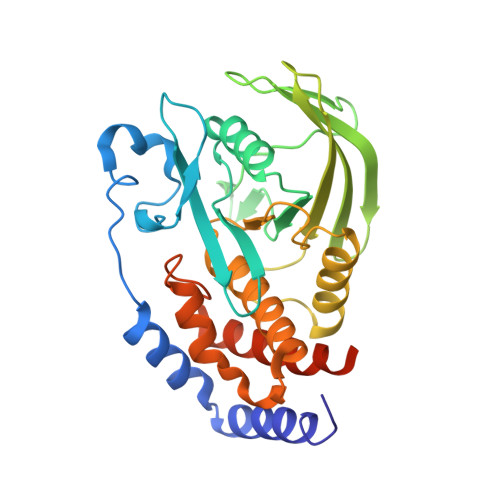Structural Basis for Inhibition of Protein-Tyrosine Phosphatase 1B by Isothiazolidinone Heterocyclic Phosphonate Mimetics.
Ala, P.J., Gonneville, L., Hillman, M.C., Becker-Pasha, M., Wei, M., Reid, B.G., Klabe, R., Yue, E.W., Wayland, B., Douty, B., Polam, P., Wasserman, Z., Bower, M., Combs, A.P., Burn, T.C., Hollis, G.F., Wynn, R.(2006) J Biol Chem 281: 32784
- PubMed: 16916797
- DOI: https://doi.org/10.1074/jbc.M606873200
- Primary Citation of Related Structures:
2CM2, 2CM3, 2CM7, 2CM8, 2CMA, 2CMB, 2CMC - PubMed Abstract:
Crystal structures of protein-tyrosine phosphatase 1B in complex with compounds bearing a novel isothiazolidinone (IZD) heterocyclic phosphonate mimetic reveal that the heterocycle is highly complementary to the catalytic pocket of the protein. The heterocycle participates in an extensive network of hydrogen bonds with the backbone of the phosphate-binding loop, Phe(182) of the flap, and the side chain of Arg(221). When substituted with a phenol, the small inhibitor induces the closed conformation of the protein and displaces all waters in the catalytic pocket. Saturated IZD-containing peptides are more potent inhibitors than unsaturated analogs because the IZD heterocycle and phenyl ring directly attached to it bind in a nearly orthogonal orientation with respect to each other, a conformation that is close to the energy minimum of the saturated IZD-phenyl moiety. These results explain why the heterocycle is a potent phosphonate mimetic and an ideal starting point for designing small nonpeptidic inhibitors.
Organizational Affiliation:
Incyte Corporation, Experimental Station, Route 141 and Henry Clay Road, Wilmington, DE 19880, USA. pauljala@gmail.com
















